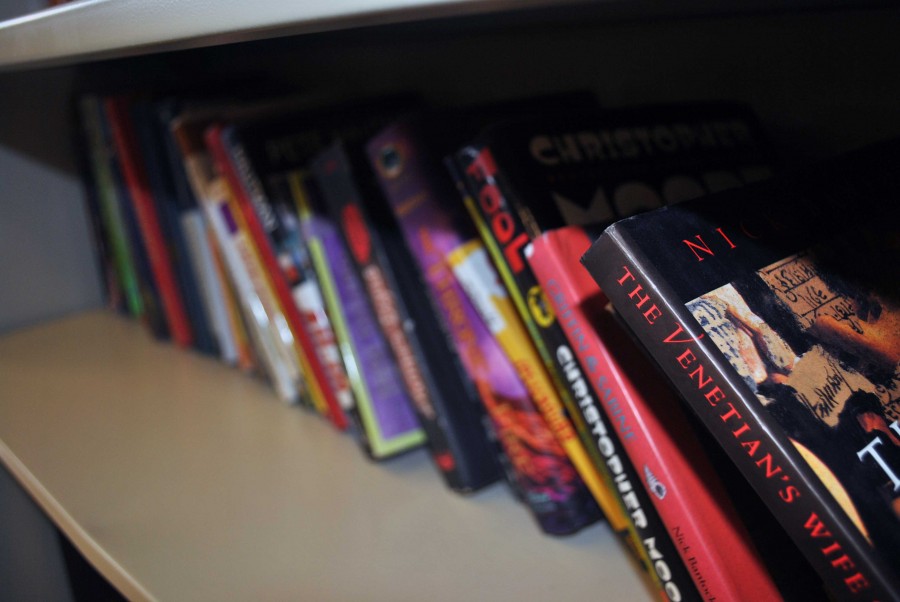In recent years, bold headlines about the state of teen reading have sent parents and teachers across the country into a frenzy: “Major drop in teens and reading,” “Teens Don’t Read for Fun Anymore, New Data Says,” “Why Aren’t Teens Reading Like They Used To?” These studies and articles decry technological changes and other factors that have “corrupted” a generation.
Indeed, many U. City students don’t feel like they’re doing much reading. According to a U-Times survey of 82 freshmen, over half read once a week or less, and almost one in four had something negative to say about the subject, usually that they simply don’t like it.
Jonah Zukosky, junior, is one of those students.
“I wish I enjoyed reading, but I don’t enough to justify it,” said Zukosky.
According to several U. City staff members, many kids who don’t like reading feel this way because they haven’t encountered many books on their reading level.
“Across U. City only about 30 to 35 percent of the students are reading on grade level, depending on which test you look at,” said Declan Fitzpatrick, district communication arts and social studies coordinator, in an email. “The biggest problem that happens when students fall below grade level is that they read less of what is assigned at school,” he said, which just makes the next year more difficult until reading becomes too overwhelming to be engaging.
Ms. Hackmeyer, English department chair, admits that the limited options presented in most English classes can also make reading less appealing.
“Students really crave choice,” said Hackmeyer.
Many books traditionally offered in English classes are difficult for students to relate to, Hackmeyer said, while assigning modern young adult fiction can be considered “dumbing down” the class.
While reading the classics can be rewarding, she said, “I also find a lot of value in reading something that is relevant for you.”
Surveyed freshmen took issue with reading assigned by teachers. Only 6 percent liked these assignments, while another 7.5 percent conceded that it would be beneficial in the long run. Forty percent of students said they dislike reading assignments; some wrote in all caps or punctuated their statements with exclamation points to emphasize their displeasure.
Time can also be a factor. Between school, extracurriculars, having a social life, and sometimes working, almost one in five surveyed students said they simply don’t have enough time to read.
“I’m a very active person and I play sports so I rarely get time to do anything but study and get homework done,” commented one freshman.
Despite students’ insistence that they don’t like reading, however, they may be doing more of it than they realize. According to the Young Adult Library Services Association, many of the articles decrying the decline of reading are focused exclusively on books. According to the organization, many people think the only “real” type of reading is done with books and do not realize just how much they read in other places.
Survey results may reflect that idea. Although almost 24 percent said they didn’t like reading, 70 percent use social media on a regular basis, and over 20 percent read articles on the internet in their spare time, including some of the same students who said they prefer not to read. Only about one in three students said they read books on their own.
Hackmeyer and Fitzpatrick both agree that technology has led to students reading more, even if they do so on less traditional platforms like the internet.
“I think students are reading more than ever, because they have instant access to information they are interested in, and because young adult literature has so many more choices,” said Fitzpatrick. “I think the few (and I do think it is a few) students who say they don’t like to read, just haven’t found the kinds of reading they like. Some people don’t like novels, but will read about celebrities, or video games, or cars, or fashion or music.”
Ms. Halter, English teacher, isn’t so sure that kids are reading more, but she still finds that technology can create interest in the written word.
“I think that any reading is great reading,” said Halter.
Hackmeyer sees the benefits of these new types of reading but still thinks books have their place.
“It can be difficult to get past all the noise we live in,” Hackmeyer said. “It’s very convenient [to read on the Internet], but I think in the end we get more from longer, structured reading.”
Markeze Gray-Williams, junior, agrees. “It’s hard for me to put a book down when I get into it,” he said.
That feeling, said Halter, is exactly what English teachers want to hear. Reading is useful for more than doing well on tests or even being successful in college, she said.
Halter’s sums up her passion for reading in a quote she admires, “A reader experiences many lives throughout their lifetime; a non-reader only experiences their own.”
































